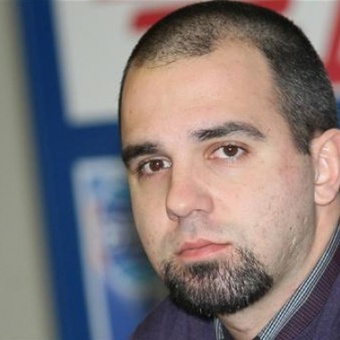Photo: all4you.bg
Victoria Mindova
Although the words "financial difficulties" and "political instability" can define the current state of Greece and Bulgaria, the crisis in both countries remains different. While Europe is trying to find a new face through a deeper economic, social and political integrity, the countries are trying to overcome the mistakes of the past in order to ensure a better future.
Political analyst Parvan Simeonov, a director at Gallup International, presents the situation in Bulgaria  to GRReporter, talking about the challenges of the country's political model, analyzing the recent developments and giving basic outlines of how the changes in Bulgaria and Greece have been influencing the social and public moods in the two neighbouring countries. The positive examples Bulgaria can draw from Greece on the eve of the extraordinary parliamentary elections are associated with the achievement of political consensus on the formation of a new government this spring.
to GRReporter, talking about the challenges of the country's political model, analyzing the recent developments and giving basic outlines of how the changes in Bulgaria and Greece have been influencing the social and public moods in the two neighbouring countries. The positive examples Bulgaria can draw from Greece on the eve of the extraordinary parliamentary elections are associated with the achievement of political consensus on the formation of a new government this spring.
How would you comment on the selection of the caretaker government?
The caretaker government will be distinguished from the previously existing political parties by inspiring a sense of expertise. As you know, its work is primarily procedural and its task is to appease the spirits. The Prime Minister’s biography is rather a "blue" one with a very significant "red" accent because his generic biography is associated with his father’s activities in the previous regime. This is obviously a search for consensus between the different political spaces and he has been preferred to appeal to different segments of the Bulgarian society.
The second search is obviously connected with finding a politician who appears "imported" to take lead of the government. Bulgarians who give the impression of successful people abroad and who have built their political career away from the current Bulgarian politics receive an extremely high evaluation in Bulgaria because involvement in the current local politics usually reduces the confidence in the person.
The third effect of the selection of the caretaker prime minister, a former diplomat, is that he has the full confidence of the Western partners. We could say that he has a strong back, due to which his political future seems calmer.
The main potential problem in the caretaker government is that a considerable proportion of its members belonged to the previous prime minister’s government. Two of the deputy prime ministers and the Prime Minister himself took leading positions in the previous government and in a key ministry such as that of the interior we have a minister demonstrating continuity of the previous government.
The problem with this government is rooted in the fact that it can be identified as a successor of the party Citizens for European Development of Bulgaria (GERB) and that is the accusation of its political critics so far. From now on, the tactics of the Bulgarian Socialist Party (BSP) and the Movement for Rights and Freedoms (MRF) to criticize the government will continue to be based on the fact that the caretaker government is the continuance of the government of GERB and the role of GERB itself will probably be more situational, as is usual for this party. Above all, we expect GERB to distinguish itself from all possible government negatives at this time to be able to tell the story of "While we were in power, there was clarity and stability, then several months of chaos followed and therefore, we are the only option for achieving stability..." This is a standard political practice.
That is why GERB will probably try to distinguish itself from the mandate of the caretaker government, whose task is not easy. MRF and BSP will do the same. Meanwhile, the situation in the streets and in the pockets of the Bulgarians will be restless too. In other words, we have a tough political environment, but it could not be otherwise bearing in mind the circumstances.
The main task of the caretaker government is to organize the elections in May. Can we expect that this will trigger other issues of national interest within two months?
First, this government’s months may be more than two. Nothing ensures us that the political parties will be able to form a government after the elections in May. Let's not forget that this will be a difficult task. Forming the government may be delayed, consensus may not be reached at all and new elections may be necessary.
Let’s make it clear. You predict that there will be a second round of elections because a government will not be formed after the vote on 12 May, don’t you?
The power is undesirable in the present situation and the entire political class is losing its legitimacy. Whatever the government formed, it will start with a very low level of public confidence. Moreover, in terms of political intolerance, which exists in Bulgaria, it will be very difficult for the recent political opponents to sit together. We expect a formula for a government of national salvation or some other programme, an expert formula of broad support to be found. This will lead to two things. The first is that there will be no clear responsibility as regards who is in power, which is highly annoying to the people in the inflamed political situation. The second is that such governments require certain political agreements, which is not well perceived too.
That is why I am saying that the formation of the next government will be difficult and we really fear that this may not happen the first time.